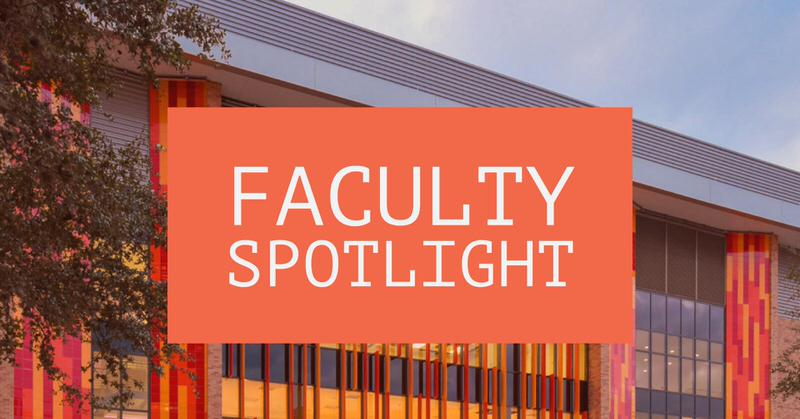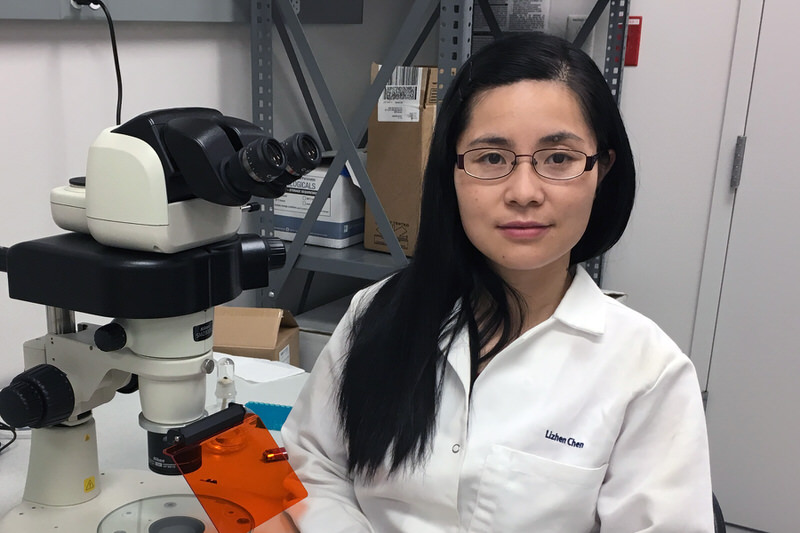Faculty Spotlight: 9 Questions with Dr. Lizhen Chen

1) P lease tell me about yourself.
lease tell me about yourself.
I am Lizhen Chen, an Assistant Professor at the Barshop Institute for Longevity and Aging Studies, and the Department of Cell System & Anatomy. I went to University of Georgia for my Ph.D and University of California, San Diego for my postdoctoral training. I started my own lab here at UT Health San Antonio in May 2016.
2) What brought you to UT Health San Antonio?
UT Health San Antonio started to attract my attention in 2009, when I just started my postdoctoral training at University of California, San Diego. One day I read a paper published by researchers from the Barshop Institute and I searched for more information about this Institute and was very impressed by the aging research at the Barshop Institute. Unlike many other aging research institutions that are focusing on age-related diseases, Barshop Institute and UT Health San Antonio is studying both age-related diseases and normal/healthy aging. So when I had the chance to apply for a job at the Barshop Institute and UT Health San Antonio in 2015, I was very excited.
3) Tell me about your research interests and why you are passionate about this topic?
The goal of our research is to discover molecular pathways involved in neuronal aging and disease, and to translate such findings into potential therapeutic targets. Specifically, the research in my lab focuses on molecular mechanisms of neuronal aging and age-dependent axon regeneration. 1 Age-dependent neurodegenerative diseases including amyotrophic lateral sclerosis, Parkinson’s, Alzheimer’s, and Huntington’s are adult-onset progressive disorders that result in significant human morbidity and mortality. Understanding how neurons age, how neurodegeneration occurs and how it might be alleviated are major public health priorities worldwide. And my lab is studying neuronal aging from the angle of microtubules, which are essential cytoskeleton. (2) Axons in the central nervous system of adult mammals fail to regenerate after injury. Lack of axon regeneration is the principal cause of no or limited functional recovery after spinal cord injury, causing life-long disability. In contrary, embryonic and early postnatal animals show a remarkable ability to regenerate axons. Despite decades of studies, the age-dependent changes and the factors influencing this transition remain largely unknown. I am interested in studying the intrinsic mechanisms underlying axon regeneration and finding treatments for neuronal injury and diseases, such as spinal cord injury.
4) What do you want the public to know about your research? Why is your topic important?
I am trying to understand the mechanisms behind the development, degeneration and regeneration of the nervous system. Although we don’t have a cure for many of the neuronal disorders (e.g. neurodegeneration and spinal cord injury), we hope that with all the research efforts we will eventually find effective treatments.
5) What is your favorite part of your job?
Discovery. The biggest reward of doing science, I think, is the moment of discovery. An example of my favorite moment is when I saw a fluorescently labeled protein rapidly changing its localization pattern in response to nerve injury under a microscope. No one had looked at this protein in neurons before, and I was really amazed by its rapid injury-induced change in localization.
6) What is the most challenging part of your job?
Getting funding to support research, a common challenge for all researchers.
7) What do you like most about mentoring students?
I like to see them grow. I have started mentoring students since I was a graduate student. I enjoyed teaching them how to do experiments and explaining the principles behind the experiments. It’s really rewarding to watch them grow.
8) How do you like to spend your free time?
I like to cook, craft and hike. Being a new faculty and a mom of two young children, I feel I don’t have much free time though.
9) What is the most helpful advice you’ve received?
“Don’t be afraid of a long task list. Get started asap and do it one by one, you will eventually complete all.”
This article is part of the “Faculty Spotlight” series which showcases faculty at The University of Texas Health Science Center San Antonio.
